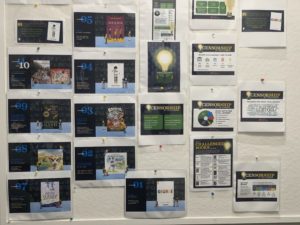
This week is Banned Books Week. Banned Books Week brings to the fore our ideas about how knowledge is disseminated and who can have it. It’s about choosing whose stories get to be told and who will be left out. It’s about lionizing the damnable and castigating those already marginalized. In my school, I commit- daily- to be different and interrogating the hierarchy of knowledge. Many of the books on the banned list are in classroom libraries and school libraries. In everything I’ve done as an educator, even if it is not directly connected to the banned books, I think about how I get to help kids make new neural pathways by decolonizing knowledge. I remind them there’s nothing they cannot do because there’s nothing they cannot know. That’s probably one of the main reasons behind banning books in the first place. There’s a desire to control dreams. There’s a desire to destroy hope. Most importantly, there’s a desire to systemically gaslight by refusing to have true representation of ALL of our stories.
During the period of chattel slavery in the United States, enslaved people were forbidden to learn to read and write. In fact, a severe beating, mutilation, or death could be exacted on an enslaved person if they were found to be literate, and their instructor would face legal and social consequences as well. When one can read, one can more easily see the inconsistencies in society and call for change. If a document states all men are created equal, and all men are not treated as such, the power of literacy can be the forerunner of a call for freedom. The ability to access knowledge and information empowers one to call for change. Change is seldom a cause for which those in power support.
Though we are no longer in the time of chattel slavery, and folks are not forbidden to learn to read and write, there are those who prefer to control what students and adults may read. When people in power in the US desired to maintain their positions by directing the life trajectories of those who were not in power through deprecation, erasure, and dismissal, the powerful found their power in literature. In fact, some of the earliest “validation” of oppression in the U.S. was in how people chose to interpret the Bible. For a time, history tells us only certain people were permitted to read, much less analyze the text. As time progressed, would-be oppressors used the written word to “prove” their biases. From texts purporting the differences in skull sizes as indicative of intelligence to political treatise advocating for legal oppression of Black people, Indigenous people, and women, books have been used to do damage. However, during this week, the focus is on people doing damage to the freedom of access to books.
Books are banned to control narratives. Often the books being banned are not telling untruths. Instead, they might be telling truths some prefer to hide. What do these realities tell us about our lives? What does it say when our country deems itself the police of the world and attempts to export a democracy it has never practiced? What does it say when a pledge to piece of cloth claims there should be liberty and justice for all, but there are stories that prove justice to be non-existent for many? What does it mean when only some citizens are treated fairly, and stories of injustice reflect the inequity?
It is important that educators remember the power of their job. It’s about liberating the mind and creating possibilities that were previously unimaginable. It’s about the power that comes from the ability to access different types of information, and the skills developed from assessing the degree to which the information is truthful, meaningful, and/or applicable to your life’s story. For too long, only the stories of the male, white, Christian, heterosexual, thin, rich, and formally educated have been told. There are so many more stories out there that are worth reading. Those stories tell us as much about other people as they tell us about ourselves. Could it be there’s a fear related to that- related to what we can be told about ourselves and our sense of reality? I still think it’s worth it. It’s worth it to push past the fear and be better today than we were yesterday. It’s worth it to learn all the stories. That’s how change happens. One story at a time.
